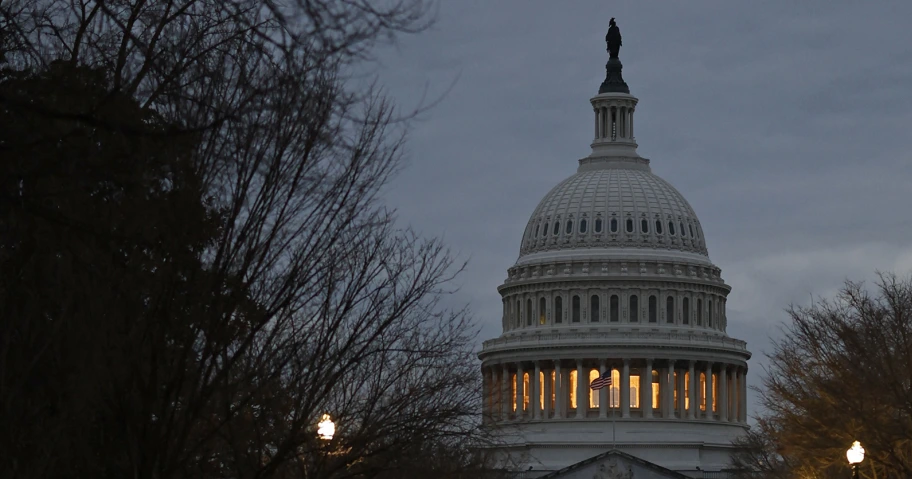WASHINGTON — The Senate gave final passage to a bill early Saturday morning to keep the government open for three more months, sending it to President Joe Biden’s desk to end the threat of a government shutdown during the holidays.
The vote was 85-11.
The Republican-controlled House passed the bill hours earlier. Although the final vote technically went past the midnight deadline to avert a shutdown, the White House said that Biden would sign the bill Saturday and avoid forcing U.S. troops, Border Patrol agents, air traffic controllers and millions of other federal workers to work without pay.
“Agencies will not shut down and may continue normal operations,” Emilie Simons, White House Senior Deputy Press Secretary, posted on X.
The House vote was 366-34, with all opposition coming from Republicans and one member voting present. It capped a tumultuous week that foreshadowed how the new Congress in January might deal with a mercurial Donald Trump back in the White House.
The package funds the government at current levels through March 14, and includes $100 billion in disaster aid and a one-year farm bill — while stripping out a debt limit extension demanded by President-elect Trump earlier in the week.
On Wednesday, Trump had threatened to primary “Any Republican” who voted for a funding bill without a debt limit extension; on Friday, 170 House Republicans did just that.
“We are really grateful that tonight, in bipartisan fashion, with overwhelming majority of votes, we passed the American Relief Act of 2025. This is a very important piece of legislation,” House Speaker Mike Johnson, R-La., told reporters after the vote. “It funds the government, of course, until March of 2025. That was a big priority for us.”
He vowed that “things are going to be very different around here” next year when Trump returns and Republicans capture the Senate.
Senate Majority Leader Chuck Schumer, D-N.Y., called it “good news” late Friday that the Senate had reached unanimous agreement to skip the usual hurdles and speedily pass the funding bill.
Just three days ago, House and Senate leaders from both parties struck an agreement to keep the government’s lights on, but Trump and his billionaire confidant Elon Musk killed the deal, insisting at the eleventh hour it needed to extend or abolish the debt limit to make way for Trump’s agenda next year.
A backup plan — slimmed down from the original deal and endorsed by Trump and Musk — then went down in flames on the House floor, tanked by Democrats as well as 38 Republicans who objected to the debt extension.
That left Johnson, who is fighting to keep his speakership, with few good options. After privately huddling with rank-and-file Republicans for more than two hours Friday, Johnson told his party he was pressing forward with Plan C: the same package brought to the floor a day earlier but without Trump’s debt increase.

President-elect Donald Trump is staying mum on the new funding plan for now.Andrew Harnik / Getty Images
Exiting the private GOP meeting, Johnson told reporters there would not be a shutdown and that House Republicans are “unified.”
“We will not have a government shutdown, and we will meet our obligations for our farmers who need aid, for the disaster victims all over the country, and for making sure that military and essential services and everyone who relies upon the federal government for a paycheck is paid over the holidays,” Johnson said.
Johnson said he spoke to both Trump and Musk on Friday. “I’ve talked to President Trump, in detail, and he knows exactly what we’re doing,” the speaker said.
Musk appeared to endorse the plan as the House was voting, writing on his social media site X that Johnson “did a good job here, given the circumstances.”
The president-elect had chosen to remain silent on the bill, according to another source familiar with his thinking. Trump’s preference was still to address the debt ceiling, that source said, adding, “Johnson should have listened when the President-elect told him this a month ago. And in every conversation since.”
But Trump may be willing to take a “win” on a funding deal that cuts a significant amount of what he saw as “pork,” the source continued, noting that the process gave Trump’s team insight into where votes are in both parties for dealing with the debt limit next year.
To get around Trump’s last-minute demand of raising the debt ceiling, Republicans have instead agreed to commit to slash more than $2 trillion in government spending and tuck a debt hike likely into a reconciliation package next year, according to multiple lawmakers.
Some Republicans doubt the debt limit pact is worth the paper it’s printed on.
“They call that a gentleman’s agreement, I think,” said Rep. Tim Burchett, R-Tenn. “And there are no gentlemen up here, dude.”
Ali Vitali
Garrett Haake, Syedah Asghar and Julia Jester contributed.



